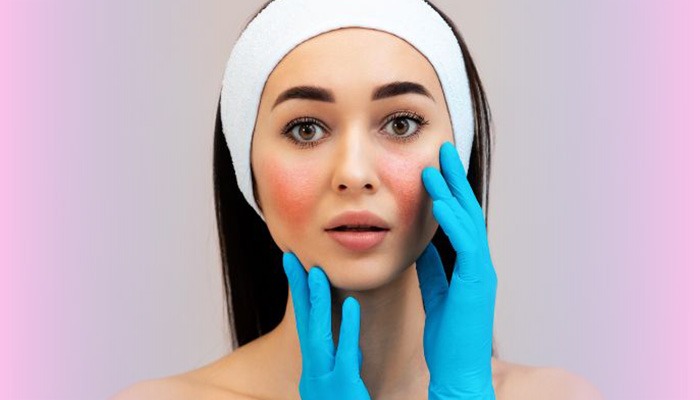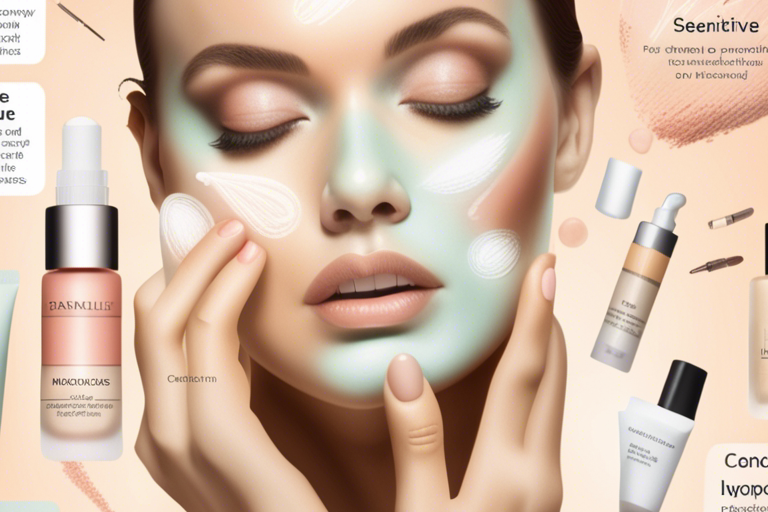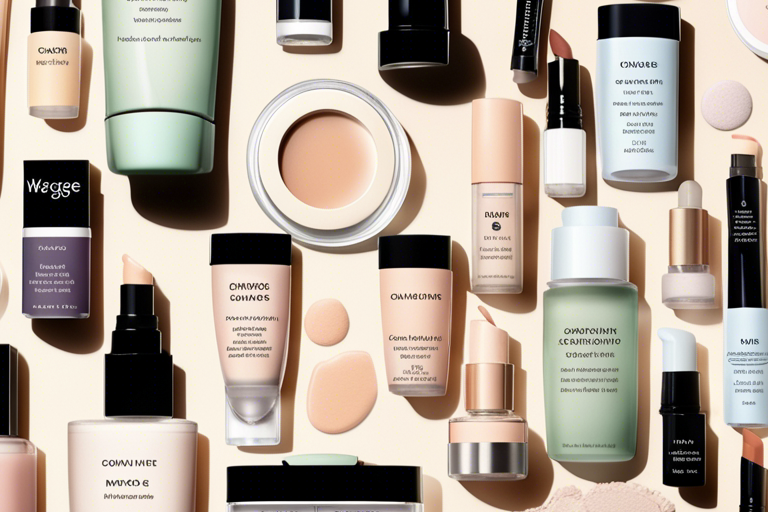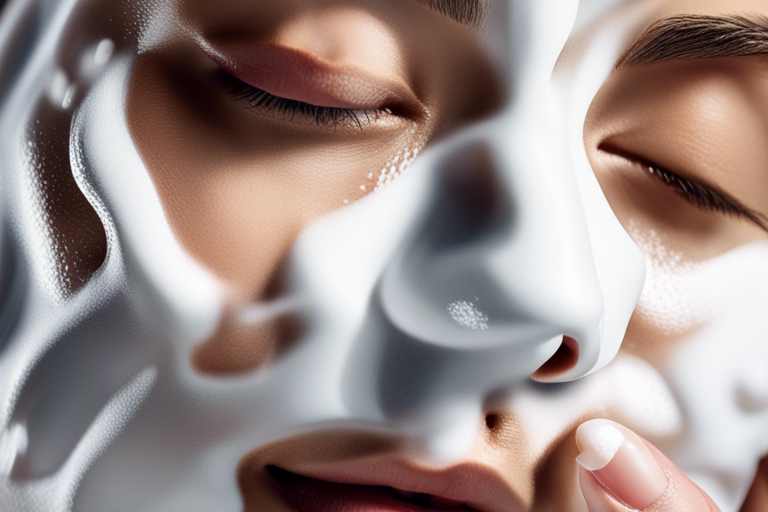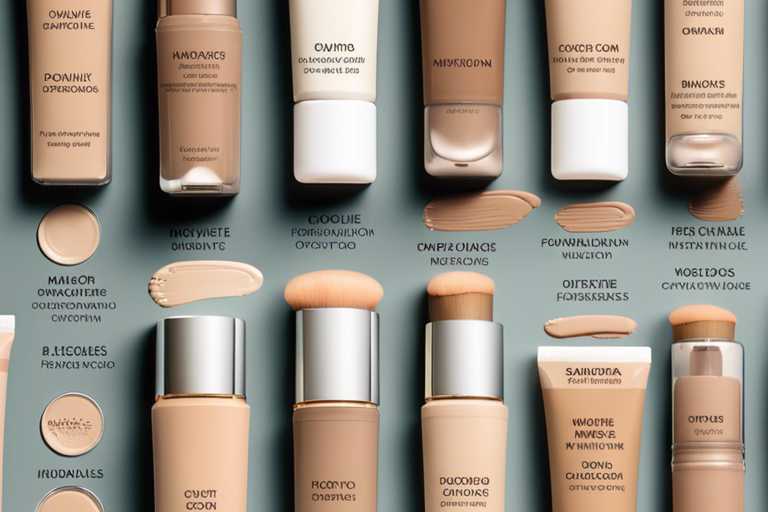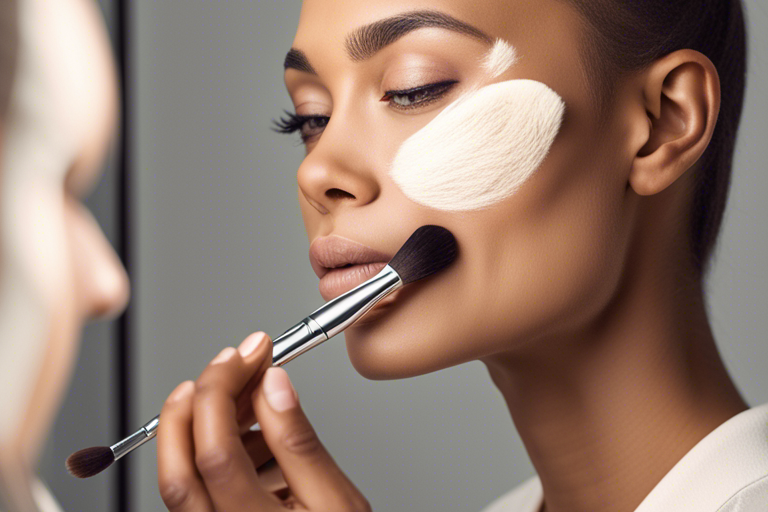Are you tired of dealing with the frustration and discomfort that sensitive skin can bring when it comes to your makeup routine? Imagine being able to achieve flawless beauty without the irritation and redness that often accompanies sensitive skin. Well, you’re in luck!
In this blog, we’ll delve into the world of makeup for sensitive skin and provide you with the knowledge and tips you need to confidently enhance your natural beauty. We understand the pain points that come with sensitive skin, and we’re here to help.
Here’s a glimpse of what we’ll cover:

1. Understanding the unique needs of sensitive skin: We’ll explore why sensitive skin requires special attention and how to identify if you have it.
2. Finding the right products: Discover the best makeup products specifically formulated Makeup for sensitive skin. We’ll discuss ingredients to look for and those to avoid, ensuring a gentle and soothing experience.
3. Creating a skincare routine Makeup for sensitive skin: Your skin’s health is the foundation for flawless makeup application. We’ll guide you through the essential steps to keep your skin calm and nourished.
4. Mastering makeup techniques: Learn expert tips and tricks to minimize irritation and achieve a stunning look that’s perfect for your sensitive skin.
Short Summmery
- Sensitive skin requires special attention and care when it comes to makeup application.
- Look for makeup products specifically formulated Makeup for sensitive skin, avoiding ingredients that may cause irritation or allergic reactions.
- Establishing a gentle skincare routine is crucial for maintaining calm and nourished sensitive skin.
- Master expert makeup techniques that minimize irritation and achieve a stunning look suitable Makeup for sensitive skin.
1. Understanding Sensitive Skin
Having sensitive skin can be challenging when it comes to choosing makeup products. It requires a thorough understanding of your skin’s unique characteristics and how certain ingredients can trigger irritation. In this section, we will dive into the key aspects of sensitive skin and provide valuable tips for achieving flawless beauty without irritation.
1. What is Sensitive Skin?
Sensitive skin is characterized by a heightened reaction to various external and internal factors. It tends to be more prone to redness, itching, dryness, and sometimes even breakouts. Common triggers Makeup for skin can include harsh weather conditions, certain skincare ingredients, fragrances, and even stress.
2. Identifying Your Skin Sensitivities
To effectively navigate the cosmetics aisle, it’s crucial to identify the specific irritants that trigger your skin’s sensitivity. Keep a close eye on the products you use and pay attention to any adverse reactions. It can be helpful to keep a skincare journal to note down any patterns or correlations between certain products and your skin’s reactions.
3. Choosing the Right Makeup Products
When it comes to makeup for sensitive skin, opting for products specifically formulated for this condition is essential. Look for labels that mention “hypoallergenic,” “fragrance-free,” and “non-comedogenic.” These formulations are designed to minimize the risk of irritation and breakouts.
4. Essential Ingredients to Avoid
Certain ingredients are known to be potential irritants Makeup for sensitive skin. Avoid makeup products that contain fragrances, sulfates, parabens, and alcohol. These ingredients can disrupt the skin’s delicate balance and trigger adverse reactions.
5. Test Patching and Spot Testing
Before incorporating any new makeup products into your routine, it’s crucial to perform a patch test. Apply a small amount of the product onto a small area of your skin, like your forearm or jawline, and monitor for any adverse reactions. Additionally, spot testing new products on a small area of your face can help determine compatibility without risking a widespread reaction.
6. Gentle Makeup Removal
Properly removing your makeup is just as important as choosing the right products. Opt for gentle cleansers that are specifically formulated for sensitive skin. Avoid harsh scrubbing or abrasive techniques that can further irritate your skin.
💡 key Takeaway: Understanding your skin’s unique characteristics and selecting makeup products specifically formulated for sensitive skin are essential steps in achieving flawless beauty without irritation.
2. Common Makeup Irritants for Sensitive Skin
When it comes to makeup for sensitive skin, it’s crucial to identify and avoid common irritants that may trigger adverse reactions. Here are some key culprits to watch out for:
1. Fragrances:
Many cosmetics contain fragrances to enhance the sensory experience. However, these fragrances can be harsh on skin, leading to redness, itching, and inflammation.
Opt for fragrance-free or hypoallergenic makeup products to minimize the risk of irritation.
2. Harsh Chemicals:
Certain chemicals commonly found in cosmetics can be irritating to sensitive skin. Examples include:
Parabens: Used as preservatives, parabens can cause allergic reactions in sensitive individuals.
Phthalates: These chemicals are often used to provide flexibility and hold in cosmetics but can disrupt the skin’s natural balance.
Sulfates: Sulfates are responsible for creating lather in many skincare and beauty products but can strip the skin of its natural oils.
3. Heavy Metals:
Some makeup products, especially those with vivid color payoff, may contain heavy metals like lead, mercury, and arsenic.
Prolonged exposure to these metals can lead to skin irritation and long-term health concerns.
Look for makeup products that are tested for heavy metal contamination and are certified safe for sensitive skin.
4. Irritating Textures:
Rough or gritty textures in certain makeup products, such as exfoliating lipsticks or powders, can aggravate skin.
Opt for smooth and creamy formulas that are gentle on the skin’s surface.
Managing sensitive skin requires being diligent about reading product labels and understanding the ingredients used. When in doubt, consult with a dermatologist who can recommend suitable makeup options for your specific needs.
💡 key Takeaway: To avoid irritation, be mindful of fragrances, harsh chemicals, heavy metals, and irritating textures commonly found in makeup products for sensitive skin. Opt for fragrance-free, hypoallergenic, and dermatologist-tested options to achieve flawless beauty without compromising your skin’s health.
3. Choosing Makeup Products for Sensitive Skin
When it comes to selecting makeup products for sensitive skin, it is crucial to prioritize ingredients that are gentle and non-irritating. Here are some key considerations to keep in mind to achieve flawless beauty without any unwanted irritation:
1. Look for Hypoallergenic Formulas:
Opt for makeup products that are specifically labeled as hypoallergenic. These formulas are designed to minimize the risk of triggering allergic reactions or skin irritations. Hypoallergenic products are typically free from common irritants such as fragrances, dyes, and preservatives.
2. Check for Fragrance-Free Options:
Fragrances can be a common culprit for skin sensitivity. Choose makeup products that are fragrance-free, as this reduces the likelihood of irritation. Look for labels that explicitly state “fragrance-free” to ensure you are selecting the right products for your sensitive skin.
3. Avoid Harsh Chemicals:
Certain chemicals commonly found in makeup formulations can be harsh on skin. Stay away from products that contain sulfates, parabens, and phthalates, as these can strip the skin of its natural moisture and lead to irritation. Opt for products with more natural and soothing ingredients, such as aloe vera, chamomile, and calendula.
4. Opt for Mineral Makeup:
Mineral makeup is a great option for sensitive skin due to its gentle and natural formulation. Typically made from finely ground minerals, these products are free from potential irritants. Look for foundations, blushes, and powders that are mineral-based to minimize the risk of skin irritation.
5. Conduct Patch Tests:
Before fully incorporating a new makeup product into your routine, it’s essential to conduct a patch test. Apply a small amount of the product onto a small area of your skin, such as your forearm, and observe for any adverse reactions for at least 24 hours. If redness, itching, or any discomfort occurs, it’s best to avoid using that particular product.
6. Read Product Reviews:
Make use of online platforms and beauty forums to read reviews from other individuals with skin. Hear about their personal experiences with different makeup products and gain insights into how certain products may affect your skin. However, it’s important to remember that everyone’s skin is unique, so what works for one person may not work for another.
7. Consult a Dermatologist:
If you have severe skin sensitivity or a history of allergies, consider consulting a
4. Gentle Cleansing and Prepping for Sensitive Skin
When it comes to makeup for sensitive skin, proper cleansing and prepping are crucial steps to ensure a flawless and irritation-free application. By following these gentle techniques, you can create a smooth canvas that allows your makeup to shine while minimizing any potential skin reactions.
1. Choose Mild and Hypoallergenic Cleansers:
Start your skincare routine with a cleanser specifically formulated for sensitive skin. Look for gentle and fragrance-free options that are free from harsh ingredients like sulfates and alcohols. These cleansers help to remove impurities without stripping the skin’s natural oils, maintaining the skin’s moisture barrier.
2. Avoid Over-cleansing:
Over-cleansing can be harsh on sensitive skin, leading to dryness and irritation. Limit your cleansing routine to once in the morning and once at night. If you have been wearing heavy makeup during the day, consider using a double cleansing method to ensure all traces of makeup are removed without compromising your skin’s integrity.
3. Use Lukewarm Water:
When cleansing your face, opt for lukewarm water instead of hot water. Hot water can strip away the skin’s natural oils, leaving it dry and sensitive. Lukewarm water helps to maintain the skin’s moisture balance and prevent further irritation.
4. Pat Dry Gently:
After cleansing, avoid vigorously rubbing your face with a towel. Instead, pat your skin dry gently using a clean and soft towel. This helps to prevent unnecessary friction and irritation on sensitive skin.
5. Apply a Soothing Toner:
A mild and alcohol-free toner can provide an extra layer of hydration and soothe sensitive skin. Look for toners that contain calming ingredients like aloe vera, chamomile, or green tea extract. Apply the toner with a soft cotton pad in gentle sweeping motions to refresh and rebalance your skin.
6. Moisturize with a Hypoallergenic Moisturizer:
Choose a moisturizer specifically formulated for sensitive skin to keep it hydrated and protected throughout the day. Look for lightweight, non-comedogenic formulas that won’t clog your pores. Ingredients like ceramides and hyaluronic acid can help restore and maintain the skin’s moisture barrier.
7. Priming for Makeup:
Before applying your makeup, consider using a primer specially designed for sensitive skin. Primers create a smooth base, prolong the wear of makeup, and provide an additional layer of protection
5. Foundation Options for Sensitive Skin
Finding the right foundation for sensitive skin can be a challenge. It is important to choose products that are gentle, hypoallergenic, and non-comedogenic to avoid any irritation or breakouts. Here are some foundation options specifically formulated for sensitive skin:
1. Mineral Foundation: Mineral foundations are a popular choice for those with sensitive skin. They typically contain natural ingredients such as titanium dioxide and zinc oxide, which have soothing and calming properties. Look for mineral foundations that are free from harmful chemicals and fragrances.
2. Silicone-Based Foundation: Silicone-based foundations create a smooth and even complexion, without clogging the pores. They provide a lightweight and breathable coverage that is suitable for sensitive skin. Look for foundations that are oil-free and have a non-greasy formula for best results.
3. Water-Based Foundation: Water-based foundations are gentle on the skin and provide a natural and lightweight coverage. They are often oil-free and non-comedogenic, making them suitable for sensitive and acne-prone skin. Look for foundations with hydrating properties to keep your skin moisturized throughout the day.
4. Powder Foundation: Powder foundations are a great option for sensitive skin as they are less likely to cause irritation. They provide buildable coverage and are easy to blend. Opt for powder foundations that are talc-free and contain soothing ingredients like aloe vera or chamomile extract.
5. BB Cream: BB creams, also known as beauty balms, are a multitasking product that offers coverage, hydration, and sun protection. They are lightweight and often infused with beneficial ingredients like antioxidants and vitamins. Look for BB creams that are fragrance-free and have a broad-spectrum SPF to protect your sensitive skin from harmful UV rays.
Remember to always perform a patch test before trying a new foundation on your sensitive skin. This will help determine any possible allergic reactions or irritations. Additionally, consult with a dermatologist or skincare professional for personalized recommendations tailored to your specific skin condition.
💡 key Takeaway: When shopping for foundation options for sensitive skin, look for mineral foundations, silicone-based foundations, water-based foundations, powder foundations, and BB creams that are gentle, hypoallergenic, and non-comedogenic, to achieve a flawless complexion without irritation. Consult with a skincare professional for personalized recommendations.
6. Concealing Imperfections without Irritation
Regenerate Select an Image
Having sensitive skin can make it challenging to find the right makeup products that won’t cause irritation or discomfort. However, there are ways to achieve flawless beauty without compromising the health of your skin. In this section, we will explore some tips and techniques to successfully conceal imperfections without irritation.
1. Choose the Right Foundation:
When it comes to sensitive skin, the foundation is the most crucial step in your makeup routine. Opt for foundations that are specifically formulated for sensitive skin types. Look for labels that indicate “hypoallergenic,” “non-comedogenic,” and “fragrance-free.” These formulations are less likely to cause allergic reactions or clog pores, ensuring a gentle and comfortable experience for your skin.
2. Test Before Application:
Before applying any makeup product to your face, it’s essential to perform a patch test. Apply a small amount of the product on your wrist or behind your ear and wait for 24 hours to see if you experience any adverse reactions. This step helps you identify potential irritants and avoid unnecessary discomfort.
3. Prep Your Skin:
Prepping your skin is crucial to create a smooth canvas for makeup application. Cleanse your face with a gentle, fragrance-free cleanser suitable for sensitive skin. Follow up with a lightweight moisturizer to hydrate and nourish your skin. Allow the moisturizer to absorb fully before moving on to the next step.
4. Use Minimal Products:
While it may be tempting to layer multiple products to achieve flawless coverage, it’s best to keep it minimal for sensitive skin. Layering too many products can increase the chance of irritation. Stick to the essentials foundation, concealer, and powder to achieve a natural yet polished look. Remember, less is more in this case.
5. Opt for Lightweight Formulas:
When choosing concealer for sensitive skin, opt for lightweight, non-greasy formulas that provide ample coverage without clogging pores. Look for concealers that are oil-free, fragrance-free, and specifically designed for sensitive skin. These formulas will give you the coverage you desire, while still allowing your skin to breathe and prevent irritation.
6. Apply with Soft Brushes or Sponges:
To minimize the risk of irritation, use soft brushes or makeup sponges for applying and blending your concealer. Avoid using your fingers directly, as they can transfer bacteria and oils onto your skin and potentially cause breakouts or irritations. Apply the concealer in thin layers
Conclusion
In conclusion, taking care of sensitive skin doesn’t mean you have to compromise on achieving a flawless makeup look. By following the tips and recommendations outlined in this blog, you can confidently enhance your beauty without risking irritation or discomfort. Remember to always prioritize gentle and hypoallergenic products specifically formulated for sensitive skin.
Additionally, proper skincare habits, such as cleansing and moisturizing, play a crucial role in maintaining a healthy complexion. Stay informed about potential allergens and irritants commonly found in cosmetics to make informed purchasing decisions. With these guidelines in mind, you can enjoy the transformative power of makeup while nurturing and respecting your skin’s unique needs. For personalized recommendations and expert advice, don’t hesitate to consult a dermatologist or skincare professional. They can help
FAQ
What ingredients should I avoid in makeup for sensitive skin?
When shopping for makeup for sensitive skin, it is important to avoid ingredients that can cause irritation or allergic reactions. Some common ingredients to avoid include fragrances, alcohol, parabens, and sulfates. It is also recommended to look for products labeled “hypoallergenic” or “non-comedogenic,” as these are less likely to cause irritation.
How do I know if my skin is sensitive?
If you experience frequent redness, itching, or irritation on your skin, it is likely that you have sensitive skin. Other signs may include dryness, flakiness, or a stinging sensation when using certain skincare products or makeup. It is always best to consult with a dermatologist to determine if you have sensitive skin and to develop a skincare routine that works for you.
What type of foundation is best for sensitive skin?
When it comes to makeup for sensitive skin, it’s important to choose a foundation that is non-comedogenic and free of harsh chemicals and fragrances. Look for products labeled as “hypoallergenic” or “for sensitive skin” to ensure that they won’t cause irritation or breakouts. Additionally, mineral foundations tend to be a safe option for sensitive skin as they are made with natural ingredients and are gentle on the skin.
How do I properly cleanse and prep sensitive skin?
Properly cleansing and prepping sensitive skin is essential for achieving flawless makeup without irritation. To start, use a gentle, fragrance-free cleanser and lukewarm water to wash your face. Pat your skin dry with a soft towel and then apply a lightweight, non-comedogenic moisturizer. For added protection, use a primer specifically designed for sensitive skin before applying makeup.
What is considered sensitive skin?
Sensitive skin is a term used to describe skin that is easily irritated by certain products or environmental factors. It may appear red, itchy, or inflamed when exposed to triggers such as harsh chemicals, fragrances, or extreme temperatures. People with sensitive skin may also experience discomfort and reactions from certain skincare or makeup ingredients. It is important to identify your individual triggers and choose products specifically formulated for sensitive skin to avoid irritation and achieve flawless beauty.
